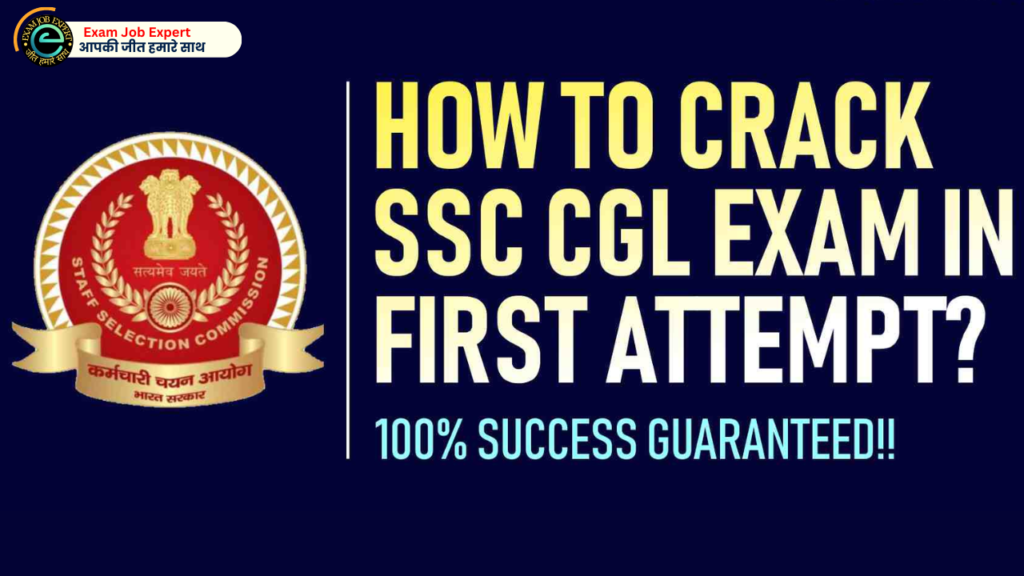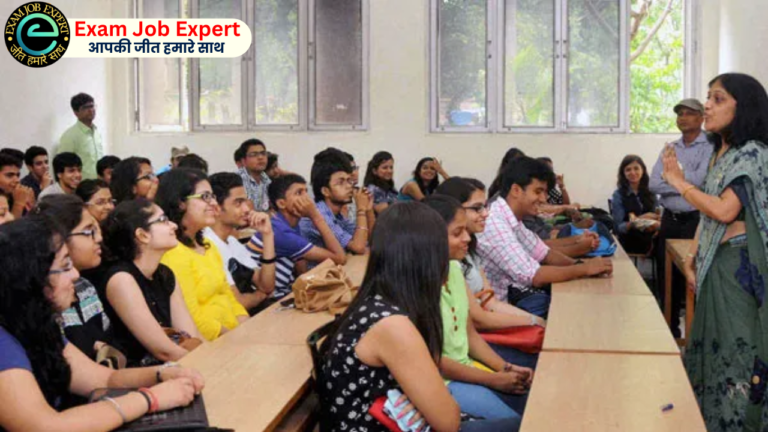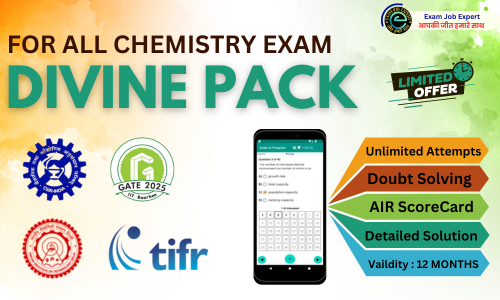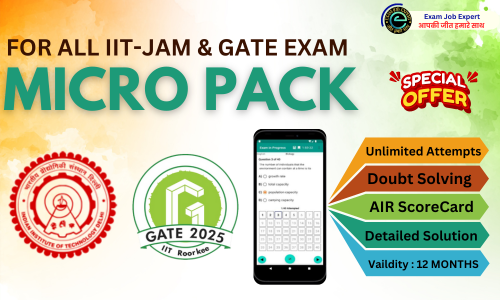SSC CGL 3 Months Study Plan, Check Complete Plan for CGL
By EXAM JOB EXPERT Published: August 28, 2024
SSC CGL 3-month study plan for the SSC CGL (Combined Graduate Level) exam. This plan is designed to cover all important topics while allowing time for revision and practice. The plan is divided into three phases: Basic Coverage, Intensive Practice, and Final Revision.
ADVERTISEMENT
Important facts to be known before SSC CGL Preparation
The SSC CGL is a national-level online test to fill several positions within the Central government and its various other ministries. This covers hiring for both gazetted and non-gazetted positions.
Create Subject-wise SSC CGL Preparation Time Table
| Time | Subject |
| 6:30 AM to 8:30 AM | Revise Your General Awareness |
| 8:30 AM – 11:00 AM | Study the language and comprehension of English |
| 11:00 AM – 1:00 PM | Break |
| 1:00 PM – 4:00 PM | Work on your quantitative portion. Give this portion extra time because it takes longer to develop speed and precision while answering mathematical issues |
| 5:30 PM – 8:00 PM | Start with the section on general thinking and intelligence after a rest and some exercise. |
| 8:00 PM – 9:00 PM | Try simulated exams again for sections you studied earlier in the day and answer questions from past exams. |
SSC CGL 3 Months Study Plan
SSC CGL 3 Months Study Plan is as follows:
Month 1: Building a Strong Foundation (Weeks 1-4)
- Understand the Exam Pattern and Syllabus:
- Familiarize yourself with the SSC CGL exam pattern, including the number of sections, marks distribution, and duration.
- Thoroughly review the syllabus for each section: Quantitative Aptitude, English Language, General Intelligence & Reasoning, and General Awareness.
- Create a Study Schedule:
- Plan a daily study schedule that allocates sufficient time for each subject and allows for regular breaks to avoid burnout.
- Set realistic study goals for each day and week, keeping in mind the amount of syllabus you need to cover.
- Focus on Basics:
- Begin with the basics of each subject, starting with easy topics and gradually progressing to more challenging ones.
- For Quantitative Aptitude, revise fundamental mathematical concepts such as arithmetic, algebra, geometry, and trigonometry.
- In English Language, brush up on grammar rules, vocabulary, comprehension, and sentence structure.
- For General Intelligence & Reasoning, practice basic reasoning concepts like analogy, classification, series, coding-decoding, and non-verbal reasoning.
- In General Awareness, focus on static GK topics such as history, geography, polity, economics, and current affairs of national and international importance.
- Practice Regularly:
- Solve SSC CGL previous year question papers and sample papers to understand the exam pattern and types of questions asked.
- Take topic-wise quizzes and tests to assess your understanding and identify areas that require further improvement.
- Utilize online platforms and mobile apps for practice, as they offer a wide range of questions and instant feedback.
Month 2: Strengthening Skills (Weeks 5-8)
- Identify Weak Areas:
- Analyze your performance in practice tests and identify topics or sections where you struggle the most.
- Prioritize these weak areas and allocate extra time to master them during your study sessions.
- Deep Dive into Topics:
- Devote focused study sessions to challenging topics, revisiting concepts and solving a variety of questions.
- Use standard reference books and study materials recommended by experts to gain in-depth understanding and clarity.
- Revision and Concept Clarification:
- Regularly revise previously covered topics to reinforce learning and ensure retention of key concepts.
- Seek clarification from mentors, tutors, or online forums if you encounter doubts or confusion while studying.
- Practice with Mock Tests:
- Take full-length mock tests regularly to simulate exam conditions and improve time management skills.
- Analyze your performance in mock tests, identify strengths and weaknesses, and strategize accordingly for improvement.
Month 3: Revision and Fine-Tuning (Weeks 9-12)
- Comprehensive Revision:
- Allocate dedicated time for comprehensive revision of all subjects, focusing on formulae, rules, and shortcut techniques.
- Review notes, flashcards, and mnemonic devices to aid in retention and recall of information.
- Solve Previous Year Papers:
- Solve SSC CGL previous year question papers and model papers to check your preparedness and identify any gaps in your knowledge.
- Analyze the solutions and understand the approach to solving different types of questions.
- Time Management Strategies:
- Practice time management techniques to ensure efficient utilization of the allotted exam time.
- Prioritize questions based on difficulty level and allocate time accordingly to maximize scoring potential.
- Stay Calm and Confident:
- Maintain a positive mindset and stay calm during the final days of preparation.
- Avoid last-minute cramming and focus on revising key concepts and strategies.
General Tips:
- Daily Practice: Solve a minimum of 50-100 questions per subject daily.
- Current Affairs: Spend 30-45 minutes daily reading current affairs.
- Revision: Regular revision is crucial. Revise the topics covered every weekend.
- Mock Tests: Take full-length mock tests every week, especially in the final month.
SSC CGL 3 Months Study Plan FAQs
1. Is 3 months enough to prepare for SSC CGL?
Yes, 3 months can be sufficient if you follow a well-structured study plan, stay consistent, and focus on both learning and practice. It’s essential to dedicate 6-8 hours daily for preparation, especially if you’re starting from scratch.
2. How should I prioritize subjects in the SSC CGL 3-month study plan?
Prioritize subjects based on your strengths and weaknesses. Start with the subjects you’re less confident in during the first month to build a strong foundation. Gradually move towards subjects you’re more comfortable with, while maintaining regular revision and practice for all sections.
3. How many hours should I study each day for SSC CGL?
Aim to study for 6-8 hours daily. Split your time among different subjects to maintain a balanced preparation. Additionally, allocate time for revision, mock tests, and analyzing your performance.
4. Should I focus more on Tier I or Tier II during these 3 months?
Initially, focus on Tier I preparation, as it is the qualifying stage. Once you feel confident about your Tier I syllabus (usually after 1.5 to 2 months), start incorporating Tier II topics into your study plan. The last month should include a blend of Tier I revision and Tier II practice.
5. How many mock tests should I take in these 3 months?
- For Tier I: Aim to take at least 1-2 full-length mock tests per week in the first two months. In the final month, increase the frequency to 3-4 mock tests per week.
- For Tier II: Start taking Tier II mock tests in the final month, ideally 2-3 per week, after completing the Tier I syllabus.
6. What should be my strategy for General Awareness?
For General Awareness, regularly read current affairs, focus on static GK topics like History, Geography, Polity, and brush up on basic concepts from Economics and Science. Spend around 30-45 minutes daily on this section, including revising important events from the past 6 months.
7. How can I improve my accuracy and speed?
Practice is key. Regularly solve previous years’ papers, sectional tests, and full-length mock tests. Analyze your mistakes and work on weak areas. Use time-bound practice sessions to improve speed.
8. How do I manage time between Tier I and Tier II preparation?
For the first two months, focus primarily on Tier I. Once you are confident with Tier I topics, gradually start incorporating Tier II subjects into your daily routine. The final month should be a mix of Tier I revision and intensive Tier II preparation.
9. Should I join a coaching class or study on my own?
This depends on your learning style. If you find self-study challenging, coaching can provide structure, discipline, and expert guidance. However, with a good study plan, quality materials, and self-discipline, self-study can be equally effective.
10. What should I do if I fall behind the study plan?
Don’t panic. Reassess your schedule, prioritize the most critical topics, and adjust your plan to catch up. Consider dedicating extra hours over the weekend to cover missed topics.
















